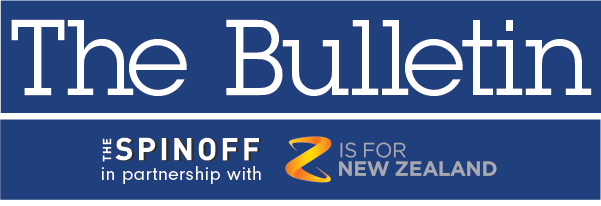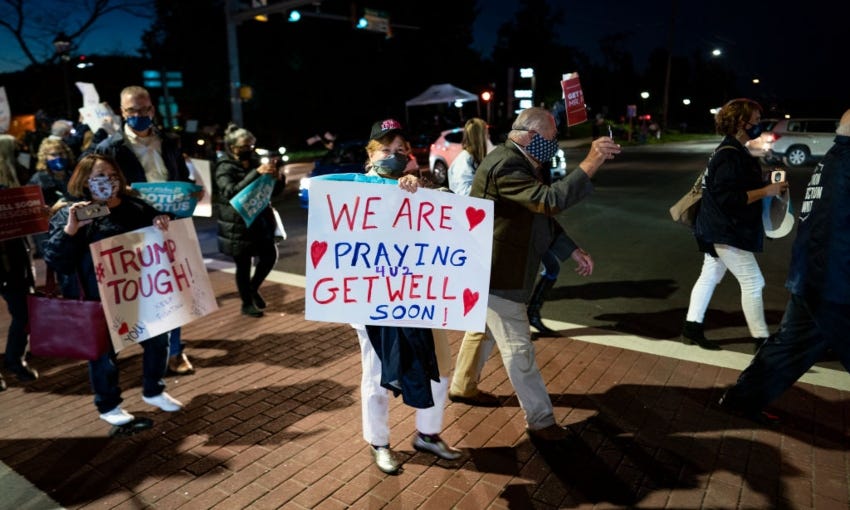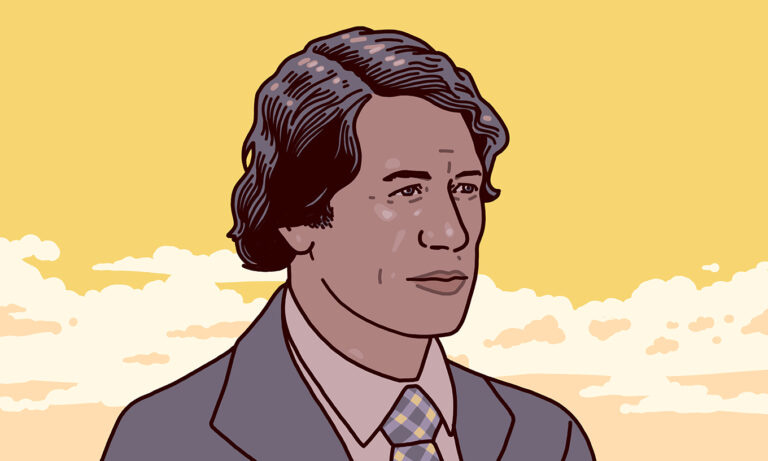Confusion surrounds Trump's Covid-19 status
The US president is in hospital, and with an election just a month away, nobody really knows how bad his condition is

Good morning and welcome to The Bulletin for Monday 5 October, by Alex Braae for The Spinoff. Presented in partnership with Z Energy.
In today’s edition: Confusion surrounds Trump's Covid-19 status, horror fire and bad flooding for lower South Island, and announcement coming on Auckland’s alert level status.

Image: Trump supporters rallying outside Walter Reed military hospital (Getty Images)
It will be impossible to have missed the news that US President Donald Trump, and many in his inner circle, have now tested positive for Covid-19. The latest is that we don't know how serious Trump's condition is, because conflicting and contradictory information has been coming out. The NZ Herald has an update of what his doctors are saying, and what treatments he is on, but the key moment of the weekend was when White House chief of staff Mark Meadows gave reporters a briefing that expressed how concerned medical staff were about his health. Covid-19 is a virus that progresses relatively slowly, so there could still be days of confusion on this front to come. At the moment, Trump remains at the Walter Reed military hospital.
It seems most likely that he picked it up at an event on September 26, though that is not certain. The New York Times has details on the White House ceremony at which the spread could have taken place, which was held to mark the nomination of potential Supreme Court judge Amy Coney Barrett. That in and of itself is a wild story, because of the politics of the nomination – Trump and the Republican party have a small window of unfettered power before the election to try and entrench the conservative majority on the court. But now, as the Guardian reports, with several US senators now testing positive (senators have to vote on Supreme Court nominations made by presidents) the window is closing.
It may be that Trump becomes too ill to govern. If that happens, CNN has an explainer on what happens next – there is a long line of succession, starting with vice President Mike Pence. However, such a determination of incapacitation requires clarity around his health, which at the moment remains mysterious. And the current White House hasn't exactly built up a reputation for credibility over the last four years, reports the Los Angeles Times – that report included a startling quote from a political science professor on confusion around the extent of Trump's illness: "That’s something you see in authoritarian regimes. You shouldn’t see that in democracies.”
What will it mean for the election? As CBS reports, the campaign of Democratic party nominee Joe Biden has swung towards positivity, with attack ads pulled from the airwaves. However he will be continuing with his schedule, with the election a month away. We've republished a piece by US politics expert Timothy J Lynch assessing the various ways this could sway voters and campaigns.
Finally, a bit of a personal digression about the – let's say complicated – emotions someone who follows the news closely feels about Donald Trump getting Covid-19. I don't ever wish painful deaths or suffering on anyone, no matter what they did in life. But let's not pretend here – Trump and his inner circle of government have brought this on themselves, through their reckless and callous handling of the pandemic. The US government's cruelty and stupidity has contributed to more than 200,000 deaths, millions of infections, and millions more lives ruined. My thoughts are with those who are battling the virus without access to presidential-level healthcare.
A terrible fire has ripped through the Mackenzie Basin, destroying dozens of homes in the Lake Ohau village. Radio NZ reports many of the houses were holiday homes, but hundreds of people have still been forced to head to an evacuation centre in Twizel. All in all it was a brutal day for Fire and Emergency NZ, who also had to fight fires in Northland, Golden Bay, and around Livingstone near Oamaru.
Further to the south, there has been far too much rain, causing flooding and damage around Southland. The Southland Times reports there are road closures across the district, and flooding from Riverton and Invercargill up to Gore, and east to the Catlins. Locals should keep an eye on further updates today, and should avoid unnecessary travel, but as of last night the news was the most flooding had drained away.
Meanwhile, a video series you really need to watch: Over the last week we've been sharing episodes from the 100 Year Forecast – you can now watch all of them here. It's about the long term impacts of climate change, and I reckon it's really pertinent in terms of the conditions that created the two stories above. After all, one of the impacts that we're going to see more of is having way too much rainfall in some places, and not nearly enough in others.
We're going to get an announcement today about if and when Auckland will return to level one. The NZ Herald's (paywalled) Derek Cheng has a useful analysis of it all, in a piece that includes discussion of modelling that suggests an extremely high probability that Covid-19 has been eliminated from the community again. Because of the rules around alert levels, it is unlikely to kick in at midnight tonight – rather it is likely the move will happen at midnight on Wednesday night.
Don't call it a travel bubble: Australia has announced that New Zealanders will soon be able to travel to New South Wales and the Northern Territory without quarantining on arrival, but as Radio NZ reports, the same won't be true in the other direction. The Australian government sees it as an initial step in a wider travel between the two countries, rather than just a lifting of restrictions into certain states. PM Ardern has also been pushing the message that New Zealanders should spend their tourism dollars domestically.
Something of a bailout for the Canterbury DHB, which has had its deficit wiped by the government for the coming year. As The Press reports, there will be strict conditions placed on that, so that spending is kept under control. The DHB has faced a leadership crisis in recent months, with droves of senior leaders quitting in protest. It is likely that into the future, further savings will only be able to be achieved by cutting services and potentially even letting staff go, so it's hard to see that as a positive for health outcomes.
Another interesting poll in Auckland Central, which will probably see a lot of attention in the next fortnight. One News has got Colmar Brunton to survey the seat, and it shows a reasonably narrow margin between the three leading candidates: Labour's Helen White is top on 35%, National's Emma Mellow is next on 30%, and Chlöe Swarbrick of the Greens is third with 26%. It could just be a case of different polling methodology, but that is closer than what Newshub had several weeks ago, with White falling away significantly from one poll to the next.
Meanwhile, the Māori electorate of Waiariki could be the best chance for the Māori Party to pick up a seat. A poll released by Te Ao News last night showed Labour's Tamati Coffey was ahead with 38%, and the Māori Party's Rawiri Waititi had 26%. But about a quarter of voters are still undecided, and during the accompanying debate Waititi said he was confident that a shift on the ground was happening. The wider poll also asked voters in the electorate about the referendums, party vote, preferred coalition partners and their top issues.
Over the next week, we'll be rolling out a series of quick hits outlining the policy platforms of various parties on various issues. To start with, here's economic policies, health policies, housing policies and transport policies. They're designed to be an easy guide to what parties are promising, and are built from the incredible database at Policy.NZ.
Got some feedback about The Bulletin, or anything in the news?
Drop us a line at thebulletin@thespinoff.co.nz

Right now on The Spinoff: We'll start with politics. Toby Manhire has looked at the pathway that National still has to forming the next government. Danyl Mclauchlan has written the life story of Winston Peters, whose political career could soon be coming to an end. Stewart Sowman-Lund meets a bouyant David Seymour, who keeps rising in the polls. Carrie Stoddard-Smith criticises the Māori Party, who she once stood for, over their immigration policy. Alice Neville asks party leaders what kai they're fuelling themselves with for the final sprint of the campaign.
And on other topics: Laura O'Connell Rapira speaks to Treaty educator Tāwhana Chadwick about the concept of rāhui, and who has the right to enact them. Simon Grigg writes about the high prices being fetched for rare NZ vinyl records. Jean Teng criticises the white-owned ‘Asian fusion’ eateries that continue to trade off casual racism in their branding. And Litia Tuiburelevu writes about the beauty industry scam of the so-called "effortless no makeup makeup” look.
For a feature today, an awesome piece about a hunter who is passing on her skills to other women in need. The Guardian's Eleanor Ainge Roy has profiled the work of Pania Tepaiho Marsh in the Horowhenua District, who found calm and self-sufficiency in the bush, after years of being a young beneficiary mother in a bad relationship. Here's an excerpt, about one of the people she has taken on her tours:
Sadé Midwinter, 31, is a single mother of two from Otaki. Last year she and her children were homeless for eight months after escaping an “ugly, abusive, violent” relationship. She went hunting with Tepaiho Marsh early this year, and now regularly accompanies her on trips with other wahine (women).
“When you look at your babies you never want them to walk through the same path you did, so I am trying my damned hardest to stop that, and steer them towards strength and healthy relationships,” Midwinter says.
Midwinter had no experience with hunting, or even the bush, when she embarked on the weekend, but she was determined to learn how to provide.
“I was just trying to do whatever I could to learn and gain knowledge, so if we were ever in certain predicaments again – I could provide for them. Being homeless is a real kick in the guts – you feel like you can’t provide the basic necessities of food and shelter. I wanted to always be able to feed my children.”
In sport, you may have heard about the allegations of domestic abuse, drug use and cover ups around former NRL star Sam Burgess. And for legal reasons, they are only at this stage allegations and are denied by Burgess. To my mind, some of the best commentary on it all has come from Harbour Heather on Sportsfreak, who outlines why it instantly seems so believable that a top level athlete – and more pertinently the club that employs them – would allow such dreadful behaviour to go on.
That's it for The Bulletin. If you want to support the work we do at The Spinoff, please check out our membership programme




